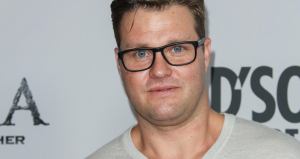Darius Rucker experienced major success in the ’90s with his rock band, Hootie & the Blowfish, but when he made the transition to solo country singer in the late ’00s, he wanted to be treated exactly the same as any other new artist. Rucker signed to Capitol Nashville in early 2008 before releasing his debut single, “Don’t Think I Don’t Think About It,” and he recently told Kelleigh Bannen on Apple Music Essentials on Apple Music Country that the label was surprised when he told them he wanted to head out on a radio tour.
“It was funny, because it was probably the second time meeting I had at Capitol and I said, ‘Do you guys do anything with radio?’” he recalled. “And they were like, ‘Well, we do a radio tour.’ I was like, ‘All right. Let’s do that.’ They were like, ‘You’ll do that?’ I was like, ‘I’ll do every single one.’ They were like, ‘We weren’t even going to ask you. We didn’t think you would do it.’ I was like, ‘Absolutely.’” The South Carolina native shared that the tour “was fun” and “did what we wanted [it] to do” and allowed him to personally deliver his new music to programmers.
Videos by PopCulture.com
“It was doing what I would want to do because I didn’t want to come in here telling everybody, ‘I’m Hootie. I’ve sold all these records. You’ve got to play my record,’” he explained. “I wanted to come in and be on the bottom of the rung and work my way up.” Rucker is one of the few Black artists that has experienced mainstream success in country music, and he recalled hearing early in his country career that his music wasn’t likely to do well because of the color of his skin.
“I heard some great stories about some radio guys not letting people in the building that were rock stars and stuff like that,” he said. “I was not hesitant. I was just going to do what we were going to do, but I was ready for anything. I had some great moments. I had some moments to this day that were very important to my life. You’ve heard the stereotype. You know, there’s no Black folks in country music on the radios. There’s not going to be anybody on the radio.” Rucker has since gone on to earn 10 solo No. 1 singles, proving some of his early naysayers wrong.
“When I would visit the radio the first time, there was three guys who are now great friends of mine, champions, and I don’t think they were trying to be mean,” he recalled. “They were being honest with me, who said to me that I don’t think the audience will accept a Black country singer. I mean, straight up. ‘I love the song, I’m going to play the song. I’m going to play it. I’m going to add it, but I just don’t think it’s going to work.’ I was like, ‘Okay, thank you for playing it. Let’s see.’ They’ve all come to me and said, ‘I’m glad I was wrong. I’m glad I was wrong.’”








